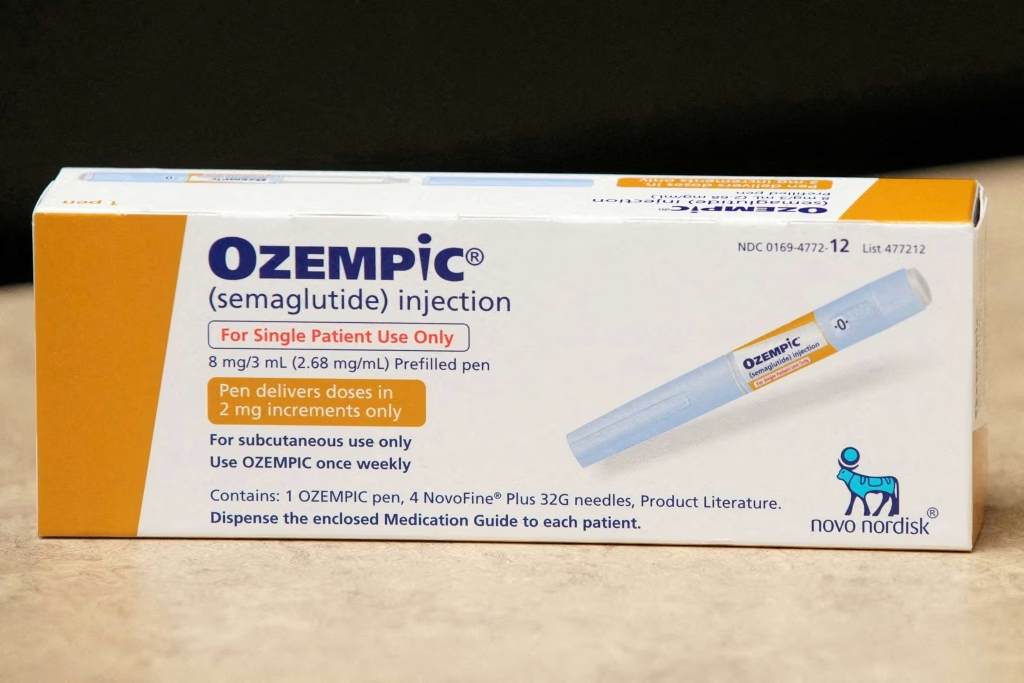Ozempic has changed how many people approach weight loss. Doctors first prescribed it to manage type 2 diabetes. Then patients noticed another effect. They lost weight. This discovery moved Ozempic from a diabetes drug to a weight loss tool. Today, more people ask about Ozempic for weight loss than for diabetes care.
What Ozempic Does in the Body
Ozempic works by copying a natural hormone. The hormone is called GLP-1. Your body releases GLP-1 after you eat. It slows the emptying of food from your stomach. It also tells your brain that you feel full. With Ozempic, these signals stay active longer. As a result, people eat less. They also feel less hunger between meals.
Doctors call Ozempic a GLP-1 receptor agonist. “Agonist” means that it activates the same spots as the real hormone. Once those receptors light up, the body reacts in the same way it would after a meal. This is why appetite drops and food intake goes down.
How Weight Loss Happens
Weight loss with Ozempic depends on two linked changes. First, your stomach takes longer to empty. Food stays inside and keeps you satisfied. Second, your brain receives stronger “I’m full” signals. These changes mean fewer calories. Over weeks, a calorie gap builds. You take in less energy than you burn. The body then uses stored fat. That is weight loss in simple terms.
Clinical studies confirm this. People on Ozempic lost more weight than people taking a placebo. The numbers vary. Some studies show average loss of 10 to 15 percent of body weight. This is more than many older drugs could achieve.
Who Uses Ozempic for Weight Loss
Doctors may prescribe Ozempic for adults with obesity. They may also prescribe it for adults who are overweight with another health problem. Conditions like high blood pressure, high cholesterol, or type 2 diabetes count here. Ozempic is not for people who only want to drop a few pounds. It is meant for patients whose weight brings clear health risks.
How Ozempic Is Taken
Ozempic comes as a once-weekly injection. Patients use a prefilled pen. The pen has a tiny needle. Most patients inject in the abdomen or thigh. The dose starts low. Then it increases step by step. This helps the body adjust and reduces side effects.
Patients must stay consistent. Skipping doses weakens the effect. Doctors often remind patients that the weekly schedule matters as much as the dose itself.
Side Effects and Safety
Like all drugs, Ozempic has side effects. The most common are nausea, vomiting, diarrhea, and constipation. These often appear when the dose increases. For many patients, the body adapts after a few weeks. Drinking water and eating smaller meals help ease these issues.
More serious risks are rare. Doctors watch for pancreatitis, gallbladder problems, or thyroid tumors. This is why a full medical review comes before a prescription. Patients with a history of these conditions may need another treatment.
Lifestyle Still Matters
Ozempic supports weight loss. But it is not magic. Diet and exercise still matter. Doctors recommend a balanced diet with fewer processed foods. They also stress regular physical activity. Patients who combine Ozempic with these habits lose more weight. They also keep it off longer.
Another factor is behavior change. Patients who track meals or join support programs often see better outcomes. The drug reduces hunger, but healthy habits keep progress steady.
How Long People Stay on Ozempic
Some patients ask, “Do I need to take Ozempic forever?” The answer depends. If a patient stops the drug, hunger often returns. Weight regain may follow. Doctors compare this to blood pressure drugs. If the root cause is ongoing, treatment may be ongoing too.
Still, not every patient needs lifelong use. Some reach a healthy weight and maintain it with diet and exercise. Others may need Ozempic long term. Doctors decide case by case.
Cost and Access
Cost can be a barrier. Ozempic is expensive without insurance. Coverage varies. Some plans cover it for diabetes but not for weight loss. Patients often need prior authorization. This means the doctor must explain why Ozempic is medically necessary. Because of rising demand, supply shortages also occur. This makes access harder for both diabetes and weight loss patients.
The Bigger Picture
Obesity rates keep rising. Traditional advice “eat less, move more” works for some. But for many, biology fights back. Hunger signals and metabolism adapt when people cut calories. This makes weight loss hard to maintain. Ozempic helps by shifting those signals. It reduces hunger at the brain level. It slows digestion at the gut level. These changes give patients a better chance to succeed.
At the same time, experts warn against seeing Ozempic as a quick fix. It is a tool, not a cure. Without lifestyle support, results may fade. With support, Ozempic can play a key role in long-term weight control.


